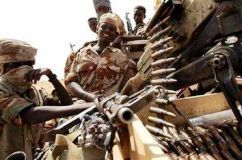No sign of peace after Darfur deal
July 11, 2006 (KHARTOUM) – The future of a peace agreement signed by a Darfur rebel faction and the Khartoum government looks bleak as violence continues, rebel factions splinter into new groups and the West looks away.
 Some analysts say the May 5 agreement, signed by only one of three negotiating rebel factions, was flawed, having been rushed through with few incentives for the rebels. Others said failure to implement the deal had led to a climate of mistrust.
Some analysts say the May 5 agreement, signed by only one of three negotiating rebel factions, was flawed, having been rushed through with few incentives for the rebels. Others said failure to implement the deal had led to a climate of mistrust.
Key deadlines have been allowed to pass without repercussions. Government and rebel attacks in violation of the deal have gone unaddressed.
“It’s highly fragile for a number of reasons…It’s unlikely to succeed in bringing peace unless there’s full implementation by the Sudanese government, more input from the international community and a larger and stronger international force in Darfur,” said Dave Mozersky of the International Crisis Group, based in Kenya.
Tens of thousands have been killed and 2.5 million people forced into camps during three years of rape, murder and pillage in Darfur in sprawling western Sudan.
The conflict erupted in 2003 when mostly non-Arab tribes took up arms, accusing the Arab-dominated government of neglect. Khartoum retaliated by arming mainly Arab militia, known as Janjaweed, who began a campaign of violence.
An ill-equipped 7,000-strong African Union force is in Darfur monitoring the widely ignored deal. Sudanese President Omar Hassan al-Bashir has repeatedly blocked attempts to deploy U.N. troops in the province, a key rebel demand.
UNPROMISING AGREEMENT
Analysts said the deal failed to address many other key rebel demands, such as determining land ownership and grazing rights, and the inclusion of international guarantees of compliance with the terms of the agreement.
“They did it in the hope this could catalyse stronger support among the general population. You could say this was an unsteady, unpromising agreement with a high probability of failure,” said Stephen Morrison at the Center for Strategic and International studies in Washington.
The deal’s defenders say it was only an initial step to pave the way for further dialogue. One analyst said the West rushed the deal through with only one rebel group on board because it was led to believe U.N. troops would soon be allowed to follow.
“(Second Vice President) Ali Osman Mohamed Taha was absolutely categorical that once a peace deal was signed … Sudan would allow UN peace keepers in Darfur. There was no ambiguity at all,” said Patrick Smith of the Africa Confidential political newsletter in London.
Sudan has rejected U.N. troops in Darfur, likening it to a Western invasion that would attract jihadi militants and cause an Iraq-style quagmire.
But analysts say Khartoum objected to U.N. troops because it feared the soldiers would arrest any officials or militia leaders likely to be indicted for war crimes by the International Criminal Court.
The top U.N. envoy to Sudan Jan Pronk has called for the deal to be widened to encourage rebels who have not signed to return to negotiations. The Sudanese government and the rebel faction that signed the deal have said they are open to additions to the text.
But analysts said current mistrust, fuelled by missed deadlines and ongoing violence, make further talks unlikely.
REBELS ACCUSED
Since the May 5 agreement, rebel groups have split into new factions and formed new alliances, making talks more difficult.
Recent U.N. reports cite witnesses alleging numerous acts of violence by Minni Arcua Minnawi’s faction of the Sudan Liberation Army (SLA), the only rebel group to sign the agreement. The SLA denies this.
Analysts were pessimistic about saving the deal.
“I think Khartoum has to be pushed into a corner on this. When he’s (al-Bashir) been under very grave pressure he has relented,” Morrison said.
But the rebels are too fragmented and weak to win military gains on the ground to force a better deal, and the international community is either preoccupied or has an interest in preserving the status quo, analysts said.
China, which has trade links with Sudan, and Russia have both hindered U.N. measures to pressure the Sudanese government.
“All eyes are going to be on the G8 summit in St. Petersburg and Sudan really doesn’t figure much in that. It’s going to be North Korea, Iran and the Middle East,” Morrison said, referring to Saturday’s summit of industrialised nations.
(Reuters)
